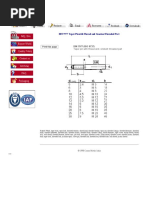Api 671 Latest Edition

Api 661 Latest Edition

Api Latest Edition
Couplings are typically specified in critical applications that operate for extended periods of time, are often non-spared, have high torque and/or speed requirements. Metallic flexible-element couplings are the primary type permitted for API 671 applications. Only and diaphragm couplings can be used in API 671 applications. The application speed & torque are the primary determining factors as to which type of metallic coupling is best suited for the application. Gear and quill shaft type couplings are permitted in the API 671 standard but are not common.

While the coupling meets the API 610 requirements; additional steps such as component serialization, precision balance, record retention of 20+ years and an assembly print containing application information are just some of the additional requirements needed to meet the API 671 specification. This is to ensure that a high quality coupling was provided for a critical application and that spare components can be produced decades into the future. One feature of the API 671 specification are the various methods allowed to achieve and measure the residual imbalance. Method 1 only requires the major components to undergo balance verification but is limited to applications at or below 1,800 rpm.
Method 2 is the standard for applications operating above 1,800 rpm. While the major components are balanced as with Method 1, the coupling is fully assembled and the balance of the entire coupling is verified prior to shipment. Method 3 is similar to Method 1 where the major components are individually balanced. The coupling is then fully assembled and the coupling is balanced as a single entity (where Method 2 only checked the balance of the coupling assembly). One limiting item is that method 3 balancing removes the ability to interchange coupling components (with the exception of disc pack units) as the coupling assembly was balanced as a cohesive unit. Recommended Follow-On Reading: To learn about API610 Couplings, we recommend.